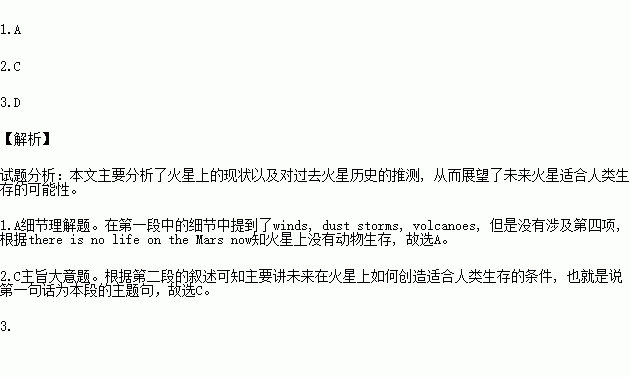题目内容
At first sight the planet Mars(火星)does not appear very welcoming to any kind of life. It has very little oxygen and water, the temperature at night is below 50 degrees and winds of 100 miles (161 kilometers)per hour cause severe dust storms. However, the surface of the planet seems to show that water flowed across it at some time in the past, and it is believed that there would be enough ice at the poles to cover the planet with water if it melted. Although there is no life on the Mars now, some scientists think there may have been some form of life a long time ago. At that time, the planet had active volcanoes(火山); the atmosphere was thicker and warmer; and there was water. In fact, in some ways the Mars may have been similar to the Earth, where life exists.
Some people believe that the Mars could support life in the future if the right conditions were produced. The first step would be to warm the planet using certain gases which trap the Sun’s heat in the planet’s atmosphere. With warmth, water and carbon dioxide(二氧化碳), simple plants could begin to grow. These plants could slowly make the Mar s fit to live on. It is judged that the whole process might take between 100, 000 and 200, 000 years. In the meantime, people could begin to live on the planet in a special closed environment. They would provide a lot of useful information about conditions on Mars and the problems connected with living there.
s fit to live on. It is judged that the whole process might take between 100, 000 and 200, 000 years. In the meantime, people could begin to live on the planet in a special closed environment. They would provide a lot of useful information about conditions on Mars and the problems connected with living there.
1. According to the passage, the planet Mars has no __________on it.
A.animals B.mountains
C.dust D.winds
2. What is the topic of Paragraph 2?
A.Certain gases should be used to warm Mars.
B.Plants should be grown to make Mars fit to live on.
C.Mars could support life with right conditions in the future.
D.People could live on Mars in a special closed environment.
3. The most suitable title for the passage is __________.
A.No Life on Mars
B.A Study of Mars
C.The Future conditions on Mars
D.The Possibility of Life on Mars


 ),并在其下面写出该加的词。
),并在其下面写出该加的词。